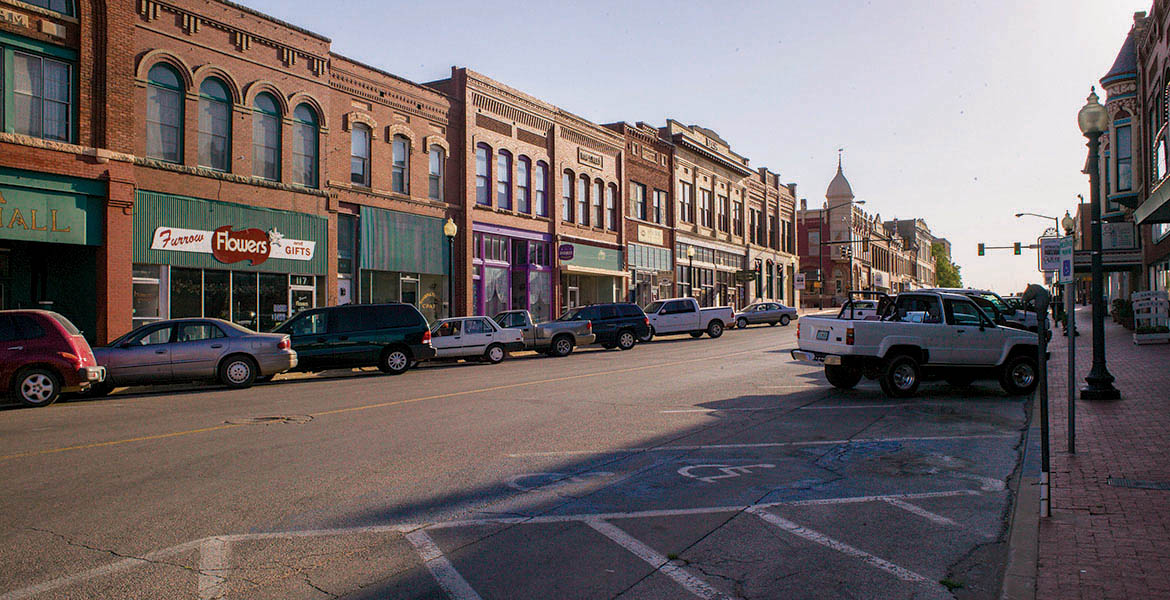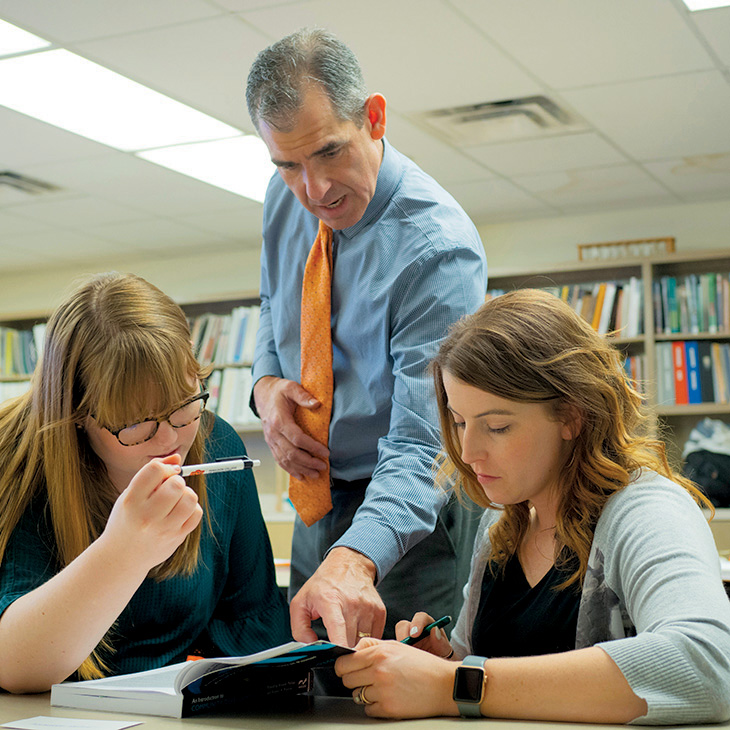
OSU's Rural Renewal Initiative wants to breathe new life into country communities
Thursday, May 14, 2020
Tucked between Oklahoma’s rolling plains and livestock ranges are hundreds of rural communities. Many are struggling.
At Oklahoma State University, a team of researchers is developing a major effort to not only stop the decline of these rural communities but to reverse it: the Rural Renewal Initiative.
“We’re going to start working here in our own back yard, in Oklahoma, recognizing that these issues are global issues,” said Tyson Ochsner, a professor in the Department of Plant and Soil Sciences and one of the initiative’s leaders.
He sees the initiative as having an immediate impact.
“The initial change is going to be the researchers going and getting engaged in communities. That is going to happen right away, this year,” he said.
The mission of the Rural Renewal Initiative is to launch the renewal of rural communities in Oklahoma and beyond through interdisciplinary research, student involvement and community engagement. The initiative plans to start its work in Tillman and Harmon counties. Ochsner knows the struggles of rural communities well, having grown up on his family’s farm near Chattanooga in Tillman County. Likewise, Shane Robinson, another key researcher leading the initiative and an agricultural education professor, is from Hollis in Harmon County.
“These are communities that we love, and these two counties are on the USDA’s list of persistent poverty counties,” Ochsner said. “They’re also on the USDA’s list of counties experiencing prolonged population loss. In fact, they are the only two counties in the state on both lists, making these counties obvious starting points.”
Persistently impoverished counties have had 20 percent or more of their population living in poverty for more than 30 years. Harmon and Tillman are two of 12 such counties in Oklahoma.
“If we succeed in this effort, our vision is a future where these rural renewal movements are growing in every state, across the country and ultimately, in every nation around the world,” Ochsner said.
For Oklahoma in particular and the world in general, a focus on rural renewal is vital.
“We have to rely on people in rural places,” Robinson said. “Those are the people who, in so many ways, are providing the food necessary to feed the world.”

In the early 1900s, much of western Oklahoma was referred to as no man’s land, and it still feels that way to many, Robinson said. Besides Tulsa and Oklahoma City, the whole state could be considered rural, he added.
“A rural town is one that is small and isolated. It is disconnected. It is even ostracized in some ways,” he said. “But then on the other side, it’s a place of hope. It’s a place of growth. It’s a place of permanence.”
The Rural Renewal Initiative is part of OSU’s Tier 1 research initiatives, a program with four designated research areas focused on solving public needs.
“As a land-grant institution, OSU’s mission is to serve the public, our people,” Robinson said. “So we have a real mission here to serve, and to extend our reach to the folks on the far corners of this state and beyond.”
Reaching to Oklahoma’s far corners, to the struggling rural towns, is more than just a job for the team because they all have rural ties and have seen the issues facing these places firsthand.
“You hear a lot about the issues of cities like crime and poverty, poor schools and deteriorating neighborhoods,” said Paul Weckler, a professor in biosystems and agricultural engineering and an initiative leader. “If you look into rural areas, they have all those problems, too.”
The picturesque family farm in small-town Oklahoma is becoming rare, Weckler said. It is getting harder and harder to maintain a rural lifestyle due to declining populations, hospital closures, lack of internet access and many other problems.
“Change takes time,” said Mark Woodring, assistant dean for rural health at the OSU Center for Health Sciences and an initiative leader. “These rural communities didn’t get into the position they are in overnight; certainly, these challenges are not going to be resolved overnight. But we can begin with incremental, positive steps forward today.”
The initiative plans to create opportunities for positive momentum, working hand in hand with these communities, Woodring said. This starts with research and relationships.
“I think we owe it to the communities that we want to help — whether that’s in Oklahoma or across the globe — that if we have a program or intervention or a change in their community, to do the research to measure and understand its impacts,” Ochsner said.
OSU is currently one of only a few universities focused on using interdisciplinary research to foster rural renewal, he added.
“I think interdisciplinary research has been missing,” Ochsner said. “We’re trying to find research-based ways to start sustainable renewal in the communities and not just saying, ‘Here’s a program. Let’s try it.’”
The initiative is a way for OSU to focus some of its research efforts and resources to thinking outside the box and creating new ideas and solutions for the problems facing rural communities, Weckler said.
“We have access to people who understand research and grant funding. We have people who are leading experts in the world on their subjects,” Robinson said. “It’s all about bringing the really tough, challenging problems to these experts.”
| Well Content |
|---|
Seed GrantsWith funding provided through the Tier 1 Research Initiatives program, the Rural Renewal Initiative is distributing seed grants to OSU researchers to focus on a variety of rural issues. “There is a grant for rural broadband and the internet of things (a system of interrelated computing devices). There’s one for rural health care systems and what role they can play in stimulating economic development. The third one is for training and equipping rural youth to be entrepreneurs and good citizens in their communities,” Tyson Ochsner said. The seed grants provide the funding to help create new innovation and ideas, Woodring said. “And that could be in technology, that could be in health care or that could be in a wide variety of sectors. And the seed grants create opportunities for those sectors to converge in ways that haven’t been applied before locally.” |
| Well Content |
|---|
Rural Scholars ProgramA Ph.D. isn’t required to solve problems, and the inaugural Rural Scholars program — starting this summer — is a prime example. The team plans to train students and send them to rural communities where they will live and work conducting research during the summer. “OSU students are incredibly bright. They’re involved in really deep studies here at Oklahoma State University. Some of them are research scholars already,” Shane Robinson said. The team sees the value in engaging students, especially those who come from rural backgrounds themselves. “A student aspect is going to provide some fresh eyes and perspective,” Mark Woodring said. “We know that they look at the world differently than we do. Our research leadership team has deep roots in rural communities, but the students have had different experiences than us, and we really value that diversity of thought and perspective.” Paul Weckler knows there are students out there who are as passionate as the researchers. “The hope is that we can bring students together who have a desire to live and work in rural places,” Weckler said. “We can share with them some of the needs that we were able to define and discover, and they can be part of the solution to the problems.” Rural Renewal Initiative leaders have already received positive feedback from residents in the targeted counties. The researchers note one community member telling them: “We are so thankful for OSU living its mission. We are proud to be a part of this. And we are so happy that you are here.” |
| Well Content |
|---|
Rural Renewal SymposiumThe initiative plans to launch the Rural Renewal Symposium at OSU in October. “I would say there are three big things we hope to accomplish with the symposium this fall: No. 1, and perhaps most importantly, it brings people together,” Tyson Ochsner said. “That is beneficial both for the residents in these rural communities, as well as for the researchers who are trying to get engaged in this kind of research.” The second element is research presentations from the rural scholars. The team wants to give these students a chance to share their experience and work, Ochsner said. Finally, a Rural Renewal Prize will be awarded. “We want to raise public awareness of the needs for this kind of research and recognize a researcher who’s really making a positive impact for rural communities,” Ochsner said. “Anyone can be nominated.” |
